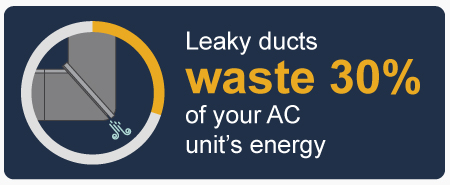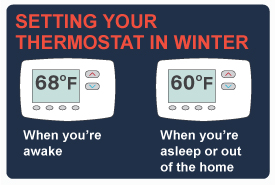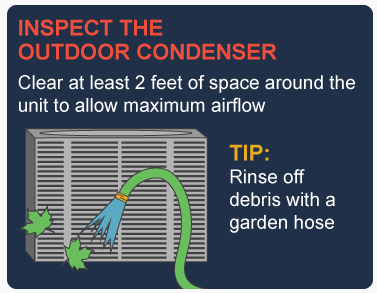Top 3 HVAC Problems in Portland During Spring
After a cold winter, it’s great to finally be able to open windows and let in the fresh air. Spring is also a good time to think about home maintenance, working on improvements, and checking tasks off the to-do List. One thing to consider is the condition of your HVAC system. Spring HVAC problems can be prevented by taking regular care of a system. Common problems Portland AC units experience include:
- Leaks
- Water, debris, and corrosion
- Freezing
- Dirty ducts, filters, fans, and coils
- Worn belts, motors, and moving parts
However, these problems can be avoided with maintenance. AAA Heating and Cooling performs inspections to provide comprehensive evaluations of specific needs, and how to maintain a system. We know how to identify, resolve, and prevent common problems.
1. Corrosion and Moisture in HVAC Systems
Water can corrode wiring and components, and reduce the efficiency and lifespan of a unit. Portland receives a fair share of rain, so it’s important to address the specific needs of a system in this kind of environment. This means taking precautions to protect a system from the elements, such as covering ducts, valves, fans, and openings vents to prevent debris and moisture from entering the system. It can be expensive to address water damage, so it’s important to catch any issues at an early stage, and learn to prevent future problems.

2. HVAC Systems Can Freeze or Leak
Once spring has finally arrived and you turn on the AC for the first time, you may discover it’s not functioning at an optimal level, perhaps as a result of damage that occurred during the winter. Cold temperatures can be problematic to an AC unit because moisture in the system can not only corrode wires, coils, and valves, but also freeze and cause leaks in ducts, valves, and pumps. Refrigerant leaks not only reduce the efficiency of a system, but they can also cause damage to other components. The extra strain decreases AC performance and can be costly.
Signs of damage include:
- Inadequate and uneven cooling
- The unit constantly runs
- High energy costs
3. Not So Fresh Air
Portland showers bring spring flowers – and flowers mean pollen. Pollen is not only a common allergen, but it can also affect the efficiency of an HVAC system. Spring is a good time to check filters for needed cleaning or replacement. With a dirty filter, pollen, dust, and other allergens will be circulated into the air you breathe. Air particles like pollen can clog ducts, affect fans, and cause a unit to work harder. This increases the energy bill and could shorten the lifespan of a system.
Coils are more exposed to the elements and are a more delicate component. They can become dirty and collect debris, reducing the efficiency of the cooling cycle. The coils require the expertise of a trained technician to clean them. If the coils aren’t operating properly, the efficiency and lifespan of the entire AC unit could be impacted.
Don’t get caught sweating in the summer heat by neglecting to do routine AC maintenance in the spring. Schedule an appointment today!
Portland Temperatures Affect HVAC Efficiency
Although the Portland metro area weather is more moderate compared to frigid east coast winters and blazing hot summers in the south, it can dramatically affect the efficiency of HVAC systems. One of the most important factors to take into consideration is the amount of moisture in the air, otherwise known as humidity. Humidity can make the summer air feel even warmer, and the rainy season in the winter makes it feel even colder.
Keeping Warm and Dry
When it’s cold outside furnaces and heat pumps work even harder to compensate for the temperature differences. Even milder winters in Portland cause people to turn the heat up on their thermostat, and fire up the furnace, which is why regular HVAC maintenance is important.
Moisture is an important factor to consider when managing indoor temperatures and maintaining an HVAC system. Water can get into small spaces where it can corrode or freeze, and damage components. Protect systems by covering exhaust and intake pipes, valves, coils, and by removing debris from ducts. Pipes, valves, and coils can freeze or break, causing a furnace to shut down and leave a home without heat in the middle of winter.
 When to Turn Down the Heat
When to Turn Down the Heat
An easy method of maintaining HVAC efficiency is by selecting the best thermostat settings for a specific space. Programmable thermostats can switch between modes on a set schedule, adjusting to the temperature that is most appropriate for the time of day. Turning the temperature down when no one is home saves energy by preventing unnecessary heating and cooling. Thermostats may also have an adjustable cycle, which prevents HVACs from frequently turning on and off to try to stabilize the temperature.
Staying Cool
When the temperatures start to climb, older, less efficient air-conditioning units have trouble cooling inside air. Portland has many older homes, which commonly have less insulation, less efficient ventilation, and older air conditioning units. In these homes it’s more difficult to control the temperature and humidity due to poor circulation. Summers in Portland aren’t the hottest in the nation, but the increase in temperature prompts people to want to cool down and use their AC units, and the humidity makes it feel even warmer.
Humidity doesn’t just make the air feel hotter and heavier, it also interferes with the transition of heat during the cooling cycle, reducing the effectiveness and efficiency of AC units. The air-conditioning cycle involves the circulation of a refrigerant: a fluid that transitions to a gas or vapor that absorbs heat from the desired location and transfers it outdoors. Air conditioners work harder when temperatures climb. This is because the air-conditioning cycle requires the outside temperature to be lower than the heat being released from the unit.
You can reduce the humidity in an area by opening doors and windows to increase air circulation, remove carpeting, which holds moisture and heat, or reduce the number of plants in a space, which increase the amount of moisture in the air.
Our Team is Here to Help
AAA Heating and Cooling can determine the best maintenance for your current system, or what kind of upgrade is best for your home or business by providing seasonal inspections. It’s important to perform routine maintenance and inspections on HVAC systems to ensure it is in proper working condition and prepared for the upcoming season. Don’t let the mild weather in Portland fool you – humidity and temperature fluctuation can affect your HVAC efficiency.
Home Safety—Carbon Monoxide Detectors & Regular Maintenance
Your home is a sanctuary. It is where you and your family spend most of your life. Part of making your home a haven of comfort is ensuring
that it is also safe. When heating Portland homes or powering appliances with gas, wood, oil or coal, homeowners and their families benefit from the preventive services that licensed contractors provide during annual inspections. Along with maintaining appliances, it is also a good idea to regularly test carbon monoxide detectors and schedule annual inspections of a home’s furnace exhaust system.
Heating Portland Homes: Why Carbon Monoxide Matters
Burning fuel—such as gas, oil, coal or wood—produces carbon dioxide. This gas is responsible for over 20,000 emergency room visits each year. While utility companies give natural gas an unpleasant odor, carbon monoxide does not have a distinct odor, color, or taste. When individuals state that they smell carbon monoxide, they generally smell the byproduct of the burning fuel, like smoke or exhaust.
The following produce carbon monoxide:
- Gas-powered vehicles and machinery
- Fuel-burning appliances
- Charcoal and gas grills
- Gas stoves
- Wood and gas fireplaces
- Candles
Carbon monoxide exists in nature and bodies need a small percentage of the gas to function. When carbon monoxide enters the body through the skin and inhalation, it binds to hemoglobin in the blood. When this occurs in higher concentrations, red blood cells cannot carry oxygen throughout the body.
Most instances of carbon monoxide poisoning occur when an individual is exposed to the gas in an enclosed space that is not ventilated. Symptoms of carbon monoxide poisoning include headaches, dizziness, nausea, confusion, drowsiness and vision problems. You might think that you suffered food poisoning or have the flu, but then find that you feel better when you are outside.
If you suspect carbon monoxide poisoning:
- Move yourself and anyone else affected by the gas outside right away.
- Call 9-1-1.
How to Prevent Carbon Monoxide Poisoning
- Install carbon monoxide detectors throughout your home, including near your bedroom. Even if you do not have gas appliances or a fireplace in your home, it is still a good idea to have at least one detector, particularly if you like to burn candles. Change the batteries in carbon monoxide detectors twice a year. Replace the detectors every five years.
- Hire a qualified licensed technician to inspect and maintain fuel-burning appliances every year. These appliances include those that run off gas, oil, wood or coal.
- Do not use outdoor grills, generators, portable flameless chemical heaters and other items meant for outdoor use inside your home.
- If the power goes out for a prolonged period and you do not have fireplace, stay at an emergency shelter, hotel, or friend’s home. Do not try to heat your home using candles or outdoor appliances. If the heating system breaks down and the electricity in your home remains unaffected, contact an HVAC contractor right away.
- Ensure that all gas appliances in your home vent outdoors.
- If the vent pipes from fuel-burning appliances crack or break, turn the appliance off and call a qualified technician right away. Do not patch the pipe with tape, gum or objects.
- Hire a professional to inspect and clean your chimneys every year.
- Do not leave your car running in the garage, even if the garage door is open.
At AAA Heating & Cooling, the safety and health of your family and home are our top priorities. We want your home to be a safe haven that feels comfortable throughout the year. If you have fuel-burning appliances, gain added peace of mind by pairing annual appliance inspections with our Indoor Air Monitoring services. Using state-of-the-art indoor air quality monitoring systems, our technicians obtain precise reports regarding harmful particulates found in your home so they can provide you with informed recommendations. If you have any concerns about your heating and cooling system, don’t hesitate to get in touch with AAA Heating & Cooling at any time of the day or night.
Photo by Shilad Sen via CC License
March Spring Cleaning – Don’t Forget Your HVAC System!
As you start storing away your winter wardrobe and preparing your home for the upcoming warm weather, it is also a good time to maintain your HVAC system to ensure optimum efficiency during the summer. Professionals recommend cleaning and maintaining your system now because it allows you to catch small problems that could compromise your home’s comfort levels during the summer, when temperatures are high and HVAC technicians have a busy schedule.
How to Prepare your Portland HVAC System for Warm Weather
- Change the air filters: Clean filters keep the air in your home healthy and maintain an HVAC system’s efficiency. Follow the manufacturer’s recommendations regarding the frequency of changing or cleaning your unit’s filters. If it’s been a while since you changed them, now is a good time for a replacement. The U.S. Environmental Protection Agency recommends replacing the filter at least every three months.
- Turn on the air conditioner: Turn on the A/C for a test run to learn if there are any issues that a professional should address before temperatures rise.
- Install or set a programmable thermostat: A programmable thermostat is an energy saving tool that sets the HVAC unit to the ideal temperature throughout the day. You can set it, for example, to begin cooling your home just as you get off work so it feels comfortable when you arrive. With smart thermostats, you can control the temperature from a smartphone or computer. You can purchase a programmable thermostat at a home improvement store and many models are simple to install without professional help.
 Learn more about programmable thermostats here.
Learn more about programmable thermostats here. - Clean the outdoor area surrounding HVAC unit: Sweep away fallen leaves, branches, dirt, and debris around an outdoor HVAC system. Similarly, cut back bushes, grass, and other plants so they don’t touch or crowd it. Maintain your landscaping by gently rinsing away dirt and debris on the A/C unit’s condenser coils with a garden hose. The coils can be found on the exterior part of the unit. Click here for a more detailed maintenance timeline for your HVAC unit.
When to Call an HVAC Professional
While there are several maintenance tasks that you can do to prepare an A/C unit for the upcoming warm weather, there are some tasks that you should leave to the pros.
- Pre-season tune-ups: Professional maintenance and inspections during the spring keep an A/C system running reliably and efficiently in the summer. Like a car, HVAC tune-ups prevent unnecessary wear and tear, and reduce the risk of an expensive breakdown. When you call a Portland HVAC professional, the technician will perform tasks such as: cleaning the evaporator coils, checking refrigerant levels, inspecting and cleaning the delicate fins, and testing the electrical components.
- Duct inspections and cleaning: Leaks in ducting can make a home feel uncomfortable, humid, and dusty. They also waste energy as leaks cause conditioned air to fill unoccupied areas of your home, such as the areas between walls. Hire a professional every three to five years to clean, inspect, and, if necessary, repair the ductwork in your home. If you are concerned about your home’s energy performance, consider scheduling a home energy audit.
Summer is an HVAC professional’s busy season. It’s also the season in which you don’t want to endure 90- and 100-degree temperatures without an air conditioner. There’s no need to sweat through the summer. Get in touch with AAA Heating & Cooling this spring to schedule A/C maintenance and inspection services so your home is prepared to handle the heat.
Photo by Philip Wilson via CC License
